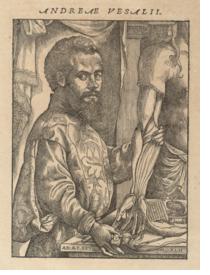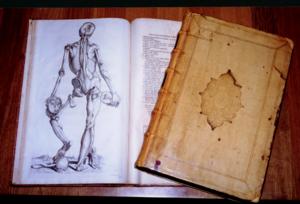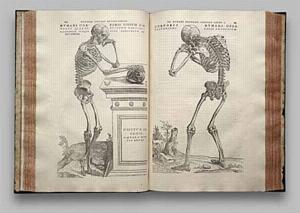Andreas Vesalius (Andries van Wesel)
Flemish physician and surgeon, b. December 1514 (Brussels, Brabant [in today's Belgium]), d. June 1564 (Zacynthus, Republic of Venice [in today's Greece]).
 Andries van Wesel belonged to a family of well established physicians. He studied at the University of Louvain in 1529 - 1533 and at the medical school of Paris in 1533 - 1536. In both cities he received the classical education based on the teachings of Galen and Avicenna, and in Paris he had access to human cadavers for dissection.
Andries van Wesel belonged to a family of well established physicians. He studied at the University of Louvain in 1529 - 1533 and at the medical school of Paris in 1533 - 1536. In both cities he received the classical education based on the teachings of Galen and Avicenna, and in Paris he had access to human cadavers for dissection.
In 1536 Vesalius returned to the University of Louvain. As part of the requirements for his degree he wrote on the Arab physician ar-Razi in 1537. He then moved to the University of Padua, where he received his M.D. and was appointed lecturer in surgery.
The University of Padua had a progressive curriculum, and as part of his duties as lecturer Vesalius had to give anatomical demonstrations. trying to improve his understanding of the human body, Vesalius performed many dissections himself and gradually came to realize that Galen's anatomical descriptions were not based on dissections of the human body but of animals.
He summarized his findings and new insights into the human anatomy in the textbook De humani corporis fabrica libri septem ("The Seven Books on the Structure of the Human Body"), generally known as the Fabrica. He presented his work to the Holy Roman Emperor Charles V in 1543 and became the emperor's physician.
In 1556, at the age of 42, Charles V provided him with a lifetime pension and made him a count. Vesalius had opened a flourishing practice in his home town Brussels three years before and continued to operate it as a highly regarded physician and surgeon. In 1559 he moved to Madrid to take up an appointment as court physician of king Philip II.
In 1564 Vesalius received leave to go on a pilgrimage to Jerusalem. He died on his return voyage; reports say that he fell ill on board the ship and was put ashore on the Greek island of Zacynthus but did not recover.
The International Society for the History of Neuroscience (ISHM), which was founded in 1995, is the publisher of the journal Vesalius - Acta Internationalia Historiae Medicinae.
Reference
Florkin, M. (1995) Andreas Vesalius. Encyclopaedia Britannica 15th ed.

Title page of De humani corporis fabrica libri septem, Lownes Colleciton of Significant Books in the History of Science, John Hay Library Brown University, Providence Rhode Island, USA.

Example pages, W. D. Jordan Library Special Collections, Queen's University Libraries Kingston, Canada

Example pages, Sundhedsvidenskabs Netbibliotek, Syddansk Universitetsbibliotek, Denmark.
home
 Andries van Wesel belonged to a family of well established physicians. He studied at the University of Louvain in 1529 - 1533 and at the medical school of Paris in 1533 - 1536. In both cities he received the classical education based on the teachings of Galen and Avicenna, and in Paris he had access to human cadavers for dissection.
Andries van Wesel belonged to a family of well established physicians. He studied at the University of Louvain in 1529 - 1533 and at the medical school of Paris in 1533 - 1536. In both cities he received the classical education based on the teachings of Galen and Avicenna, and in Paris he had access to human cadavers for dissection.

